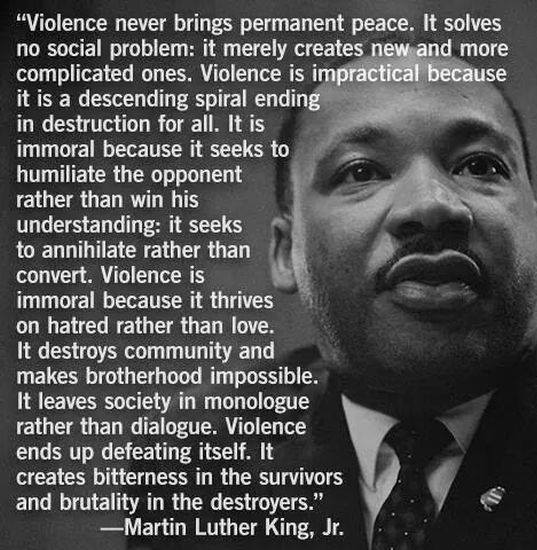I’ve seen the following meme passed around on Facebook in recent days, generally in response to the protests in Ferguson. I think that the quote lacks context.

The meme, in case you can’t see the image, it quotes Martin Luther King, Jr. as follows:
Violence never brings permanent peace. It solves no social problem: it merely creates new and more complicated ones. Violence is impractical because it is a descending spiral ending in destruction for all. It is immoral because it seeks to humiliate the opponent rather than win his understanding: it seeks to annihilate rather than convert. Violence is immoral because it thrives on hatred rather than love. It destroys community and makes brotherhood impossible. It leaves society in monologue rather than dialogue. Violence ends up defeating itself. It creates bitterness in the survivors and brutality in the destroyers.
A common tactic to discredit a movement is to point to illegal acts of some people and associate that with the entire group. That way, people start to see nothing but violence in months of peaceful protests with only sporadic violence by some people, combined with people’s reactions to a grossly disproportionate police response (and I don’t think that ought to be a controversial characterization of the situation in Ferguson from August until a few days ago, but others may disagree).
I think it’s important to look at the MLK quote in its broader context. He drew a considerable amount of inspiration from Gandhi, who for all of his virtues had an almost comically naive view of how people should have responded to Germany in WWII. That said, nonviolence is a strategy that is much more complex than just saying “don’t be violent.” Without expressly defending certain things that may have happened on the protesters’ side in the past few months, I will say that history reveals again and again that you can only push people so much before they start to push back, and people in Ferguson have been pushed quite a bit. Now, getting back to the MLK quote, here’s a larger section from the speech (his acceptance speech for the Nobel Peace Prize in 1964):
Continue reading →







